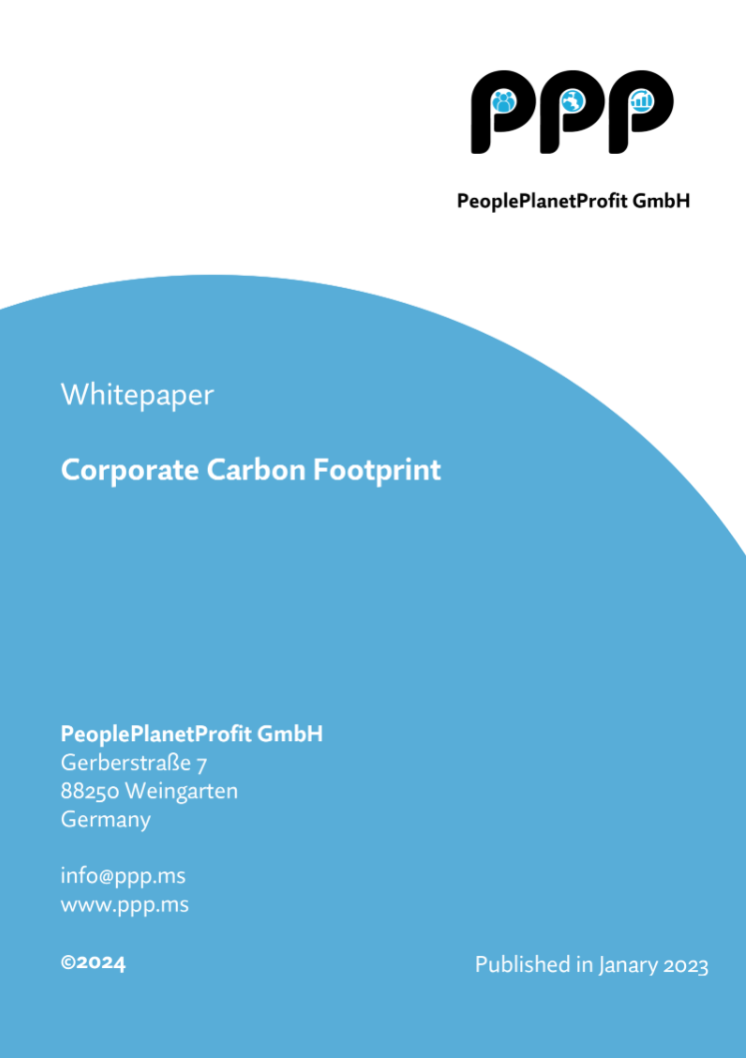Corporate carbon footprint – sustainability in companies
What is the Corporate Carbon Footprint (CCF)?
The Corporate Carbon Footprint (CCF) is a balance sheet that shows the direct and indirect greenhouse gas emissions of a company. Direct emissions arise from the production process or the use of company vehicles, while indirect emissions are caused by the purchase of electricity or the transportation of raw materials. The CCF is used to measure, understand and reduce the ecological footprint.
Why should your company calculate the CCF?
Companies should calculate the CCF in order to fulfill their responsibility towards the environment and society. By calculating the CCF, they can better understand their impact on the environment and develop and implement measures to reduce it. This not only leads to efficiency gains and cost savings, but also to a competitive advantage in the area of sustainability.
In addition, CCF calculation is part of risk management as it prepares for the effects of climate change and fulfills legal requirements. Investors, consumers, governments and environmental organizations also use the CCF to evaluate a company’s environmental friendliness and sustainability efforts.
All the advantages of CCF at a glance
Understanding the impact on the environment
Helps to develop a well-founded climate strategy
Basis for action planning
Acting with environmental awareness
Strengthen corporate image
Meet legal/regulatory requirements (CSRD)
Cost reduction through increased efficiency
Creating transparency internally and externally
Taking responsibility for the environment and society
Competitive advantage through improved efficiency and image
Recognition of optimization potential
Risk reduction with regard to climate change
Access to capital (investors / financial institutions)
Strengthening customer loyalty and meeting customer requirements
Our corporate carbon footprint services:
Our services support companies in implementing and maintaining their corporate carbon footprint. We offer comprehensive support and customized solutions to ensure that your company successfully implements all the necessary steps towards sustainability.
- Advice and support with the introduction and maintenance of the CCF
- As-is assessment
- Gap analysis
- Preparation of required documents
- Internal audits and audit support
- Documentation and follow-up
- Implementation of new processes and procedures
- Controls and monitoring for recertification
- Training and further education for employees
Unique advantages with PPP
Working with us brings unique benefits. These support not only the CCF calculation, but also the implementation of sustainable business practices. Ongoing support and training for employees are unique services that enable greater implementation success.
- Fast turnaround: Using state-of-the-art software, we deliver results in record time.
- International team: Our global team is here to help you with all your questions and projects.
- Industry expertise: Our team has extensive knowledge of sustainability, environmental management and CO₂ accounting and can draw on many years of experience in various industries.
- Tailor-made solutions: We offer individual advice and services tailored specifically to your company’s needs.
- Efficiency and time savings: By using standardized templates, we help you to make the supply chain more legally compliant, sustainable and efficient.
- Ongoing support: We are your long-term partner for sustainability. Our support does not end with the assessment, but includes the development of a sustainable strategy for the future.
- Improved sustainability practices and strengthened image: The improved sustainability practices can strengthen the brand and corporate image. We support you in integrating these findings into your marketing strategy.

CCF - Whitepaper
Receive whitepaper
Send download link to: |
Free initial consultation
Would you like to find out more about the Corporate Carbon Footprint? Contact us for a free initial consultation and find out how we can support you on your path to sustainability.

Patrick Wortner
CEO | MBA and Eng., Dipl.-Ing. (FH)
Calculation of the CCF
The CCF is a balance sheet that shows the greenhouse gas emissions of a company. It considers direct (Scope 1 emissions), indirect (Scope 2 emissions) and emissions along the value chain (Scope 3 emissions). Direct greenhouse gases arise, for example, from the production process or the use of company vehicles, while indirect greenhouse gases result from the purchase of electricity or the production and transportation of raw materials used. Indirect emissions along the value chain also include employee business trips, production waste or the handling of products at the end of their life cycle.
The calculation is based on recognized standards such as DIN ISO 14064 or the Corporate Standard of the Greenhouse Gas Protocol (GHG Protocol). Data collection and reporting on emissions of carbon dioxide (CO2), methane (CH4), nitrous oxide (N2O), hydrofluorocarbons (HFCs), perfluorocarbons (PFCs), sulphur hexafluoride (SF6) and nitrogen trifluoride (NF3) is carried out using sector-specific calculation tools. CO2 equivalents are calculated from these greenhouse gases in order to obtain a uniform value. The sum of the emissions represents the company’s CCF.
Options for CO2 verification
The recording of CO2 emissions can be verified externally by independent auditors or certification bodies, internally by a specialized team on the basis of standards such as DIN ISO 14064-1 and DIN ISO 14064-1 or the Corporate Standard of the Greenhouse Gas Protocol (GHG Protocol).
The calculation of CO2 emissions can also be part of the verification in industry-specific certifications (e.g. Renewable Energy Certificate (REC), SmartWay Certification, GlobalG.A.P. Certification, Responsible Care Program, LEED (Leadership in Energy and Environmental Design), Cradle to Cradle Certification). Proper documentation and calculation of the data must be ensured.
Verification according to ISO 14064: Why is this crucial?

The standard consists of three parts. The first part defines the guidelines for reporting greenhouse gas emissions and their avoidance. The second part looks specifically at project-based emissions and the third part describes guidelines for the verification of greenhouse gas reports.
Verification in accordance with ISO 14064 represents a uniform, cross-industry standard that makes it possible to make reports from companies comparable. Verification with an accredited body gives stakeholders greater confidence in the fulfillment of requirements.
Cost structure for verification
The cost of verification depends on the size and complexity of the company and the certification system chosen. Individual consultation is advisable for an accurate cost estimate.
Why it makes sense to work with an experienced partner
Working with an experienced partner offers numerous advantages. Experienced partners already have established solutions and comprehensive specialist knowledge that is always up to date. This ensures cost-effective and time-efficient implementation of verification. In addition, experienced partners ensure the accuracy, completeness, and reliability of the reports and ensure that all environmental standards are complied with. Outsourcing the preparation of the reports allows companies to concentrate on their core business.
Why our company is the right choice
Our many years of experience and in-depth expertise in the field of carbon accounting and verification make us your ideal partner. We offer customized solutions specifically tailored to your company’s needs and support you at every step of the process.
Outlook
In the coming years, the importance of the corporate carbon footprint (CCF) will continue to grow. There is increasing pressure from governments, investors and consumers for companies to reduce their environmental impact and operate more sustainably. Future developments could include stricter legal requirements, extended reporting obligations and greater demands for transparency and verification of emissions data.
Companies that invest early in calculating and reducing their CCF will not only meet legal requirements, but will also gain a competitive advantage and strengthen their position as environmentally conscious and responsible players. Innovations in data collection and analysis as well as new technologies to reduce emissions will support and drive this process forward.
The path to a more sustainable economy requires continuous effort, collaboration and a willingness to adapt to new challenges and opportunities.
Free initial consultation
Would you like to find out more about the Corporate Carbon Footprint? Contact us for a free initial consultation and find out how we can support you on your path to sustainability.

Patrick Wortner
CEO | MBA and Eng., Dipl.-Ing. (FH)
Frequently asked questions
What is the Corporate Carbon Footprint (CCF) and why is it important for companies?
The Corporate Carbon Footprint (CCF) is a balance sheet that shows the direct and indirect greenhouse gases emitted by companies. It is used to measure, understand and reduce the company’s own footprint. Stakeholders also have an interest in the metric, which indicates a company’s sustainability efforts.
For whom is the calculation of the corporate carbon footprint relevant?
For the company itself, the CCF is relevant in its climate strategy, but stakeholders such as customers, investors and financial institutions, governments and authorities, environmental organizations and society also have an interest in a company’s sustainability.
Why should a company have its corporate carbon footprint verified?
Verification of the corporate carbon footprint increases credibility and trust among stakeholders. Verification also allows errors in the calculation to be identified and rectified. Verification is also a customer requirement and ensures uniform calculation and compliance with legal requirements.
What are the benefits of analyzing the corporate carbon footprint?
Analyzing the corporate carbon footprint enables companies to understand their impact on the environment and develop a well-founded climate strategy. It forms the basis for planning measures and promotes environmental awareness within the company. Effective measures for environmental protection can be defined and implemented, leading to efficiency increases and cost reductions. The analysis also ensures internal and external transparency and reduces risks with regard to climate change and customer loyalty.
Why is it important to work with experienced partners in CCF verification?
Experienced partners have established solutions and comprehensive expertise that is always up to date. This ensures cost-effective and time-efficient implementation of verification. Experienced partners ensure the accuracy, completeness and reliability of the reports and ensure that all environmental standards are complied with. Outsourcing the preparation of reports allows companies to concentrate on their core business.

